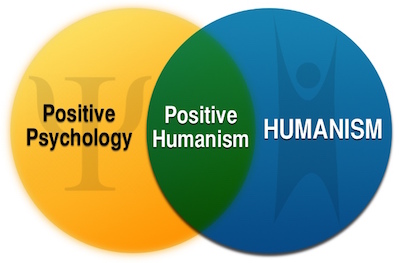Positive humanism is an applied humanistic philosophy based on the scientific findings of positive psychology that focuses on personal, professional, and societal flourishing.
 Translation: As an applied philosophy it offers practical solutions to increase well-being. As a humanistic philosophy, there are no appeals to the supernatural, the magical, or the mystical—the philosophy is founded on reason and critical thinking. The philosophy is science-based, meaning it is void of the unsupported and/or exaggerated claims and the constant confusing of correlation with causality often found in the self-help genre. The philosophy is grounded in the theories of positive psychology, which is the study of the other side of the mental health spectrum—human thriving. The philosophy focuses on concrete strategies to help individuals in all areas of personal growth and professional success, primarily through being of prosocial acts and through distributed kindness.
Translation: As an applied philosophy it offers practical solutions to increase well-being. As a humanistic philosophy, there are no appeals to the supernatural, the magical, or the mystical—the philosophy is founded on reason and critical thinking. The philosophy is science-based, meaning it is void of the unsupported and/or exaggerated claims and the constant confusing of correlation with causality often found in the self-help genre. The philosophy is grounded in the theories of positive psychology, which is the study of the other side of the mental health spectrum—human thriving. The philosophy focuses on concrete strategies to help individuals in all areas of personal growth and professional success, primarily through being of prosocial acts and through distributed kindness.
ISBN: 978-1-4566-2355-5 (ebook) / ISBN: 978-1-4566-2462-0 (paperback) / Published by: Archieboy Holdings, LLC. / Published Date: 2014-11-05
 Refreshing and concise. This short primer is a great way to introduce the concepts of positive humanism. It's great to see a spin on non-belief centered on what's right rather than attacking what is wrong. I look forward to learning more about this fascinating topic.
Refreshing and concise. This short primer is a great way to introduce the concepts of positive humanism. It's great to see a spin on non-belief centered on what's right rather than attacking what is wrong. I look forward to learning more about this fascinating topic.
 It's a good addition to the written world of Humanism. This is a much needed book. It has lots of good science to back it up and if you are struggling with the woo aspects of the self help movement - or you are looking for an alternative to angry atheism - I think this book can help.
It's a good addition to the written world of Humanism. This is a much needed book. It has lots of good science to back it up and if you are struggling with the woo aspects of the self help movement - or you are looking for an alternative to angry atheism - I think this book can help.
 Stands by it's guns, peaceably . This is a good place to start if you want to see how much humanism can be about living a respectable, rewarding life. It's also a reasonable indication of how very little humanism is about hedonism. It is balanced, fair, and makes one want to see more sources of it's kind become available.
Stands by it's guns, peaceably . This is a good place to start if you want to see how much humanism can be about living a respectable, rewarding life. It's also a reasonable indication of how very little humanism is about hedonism. It is balanced, fair, and makes one want to see more sources of it's kind become available.
This book is available from various retailers in the following formats:
Paperback Audiobook Ebook (.pdf) Ebook (.mobi) Ebook (.epub) Online CourseThe author is available for select interviews. If you are interested in conducting an interview, please enter the details of your media outlet. If you are contacting the author for another reason, please enter the reason. Although we don't guarantee all messages will be responded to, the author does their best to respond to all requests and all messages will be read.